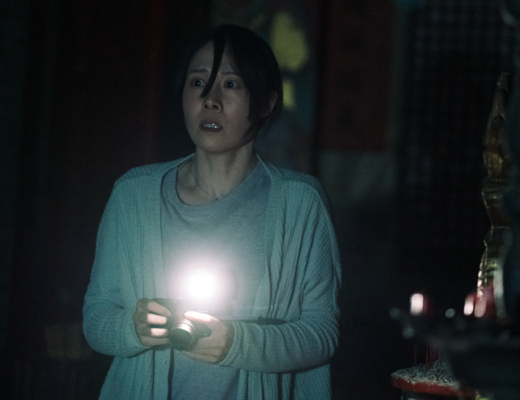Ellie Foumbi’s Our Father, the Devil takes the broad, familiar strokes of the revenge drama and fashions them into something altogether more tragic. The film begins with a fuzzy, opaque image; a woman, Marie (Babetida Sadjo), sits at a café smoking and sipping coffee. The camera pans just a bit and reveals that we are not observing her through glass, but are in fact looking at her reflection in a window. It’s a key visual motif — a kind of bifurcation of the self — that literally displays two Maries. It will eventually become clear that she’s not so much living two lives, but that a hazy past life is constantly threatening to supplant her current existence. It’s an important distinction, and the entire crux of Foumbi’s emotionally charged feature debut.
That current existence seems stable, if unremarkable. Marie is the head chef at an assisted living facility; she works with her best friend, Nadia (Jennifer Tchiakpe), and one of the residents is Marie’s former culinary mentor, Jeanne (Martine Amisse), who still critiques Marie’s dishes from her sick bed. Marie and Nadia seem to have reached a détente with their casually racist boss, and while the women are overworked, they still find time for a weekly girls movie night. It’s all pleasant enough, but Marie carries a weight with her. She’s professional but closed off, seemingly unwilling to seek out relationships — a hunky waiter at the aforementioned café seems very interested in Marie, for instance, although she politely rebuffs him every time he flirts with her. But everything changes when she lays eyes on Father Patrick (Souleymane Sy Savane); or, more precisely, when she hears his voice. The new priest is making the rounds of the facility, winning over the residents with words of wisdom put forth in soothing, dulcet tones. Marie hears this voice from a distance and seems to enter a fugue state, cautiously approaching the room it’s emanating from. The camera creeps with her, peering from behind a corner to catch a glimpse of this stranger, at which point Marie immediately faints. It’s not clear at first how she knows this man or why she is so nervous around him; Foumbi walks a fine line between in determining how much to reveal in these early scenes, but things eventually reach a boiling point. Father Patrick invites himself back into Marie’s kitchen under the pretense of asking for some food, patiently but insistently making more and more requests of her, until she cracks him over the head with a skillet. It’s a remarkable sequence; long, stretched out, aching with tension. Foumbi and cinematographer Tinx Chan link the scene with our initial introduction to Marie by centering Father Patrick in the middle of the frame, as if he is anchoring the camera, while he dictates Marie’s movements. Eventually, the camera shifts just a bit so that we see Marie traversing the kitchen, the Father’s reflection cast on surfaces in the background. Like Marie, he too has a ghost image, a sort of symbolic doppelgänger, but it’s also implied that he is all around her.
What follows is a variation on Polanski’s adaptation of Death and the Maiden; Marie ties Father Patrick up, accusing him of being a warlord named Sogo from their home country of Guinea and responsible for the death of Marie’s family. He denies it, of course, and much of the film’s middle stretch is taken up with this he said/she said scenario. But Foumbi doesn’t play coy with the audience for long — a definitive answer to the man’s identity is given, not so much as a twist or grand reveal than as an invitation to ponder the limits of forgiveness. Can people change? Sadjo is remarkable here, delivering what’s sure to stand as one of the year’s best performances. She’s equally adept at calm stillness and barely contained rage, her vocal inflections alternating between fear and righteous fury. She gets a show-stopping monologue about halfway through the film, recalling the night that Sogo and his children’s army attacked her village, the death of her parents and siblings, and her long journey to France as a refugee. Sadjo lays it all out in affectless monotone, as if even the memory of this tragedy renders everything numb. The film periodically threatens to indulge in cliché, a kind of pat, “those who seek revenge should dig two graves” platitude. But Sadjo’s performance infuses the proceedings with an intensity that papers over any rough patches, and the film’s final moments deliver an emotional wallop. We are left with a final image that points to an uncertain future, but one that suggests at least a glimmer of hope still exists.
DIRECTOR: Ellie Foumbi; CAST: Babetida Sadjo, Souléymane Sy Savané, Jennifer Tchiakpe; DISTRIBUTOR: Cineverse; IN THEATERS: August 25; RUNTIME: 1 hr. 48 min.







